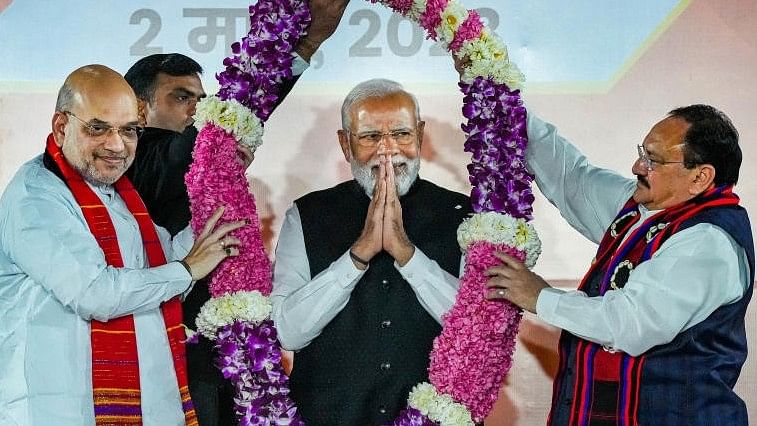
Amit Shah, Narendra Modi and JP Nadda.
Credit: PTI
By Karishma Vaswani
It could have been a scene in a Bollywood film. In the early hours of the morning of Oct. 3, police turned up at the homes and offices of reporters, snatching mobile phones and laptops. More than 40 journalists were questioned, among them some of the country’s most well-known news people.
Delhi police arrested the 76-year-old editor-in-chief of the online bilingual newspaper NewsClick, Prabir Purkayastha, and its administrative officer on terrorism charges. The news website has been critical of Prime Minister Narendra Modi’s government and has been investigated before, in 2021, when it was raided by tax authorities on allegations of breaking India's foreign direct investment rules.
This crackdown is just the latest assault on media and intellectual freedom in the world’s most populous country: In the last 12 months or so, income tax authorities have searched BBC offices in India; a prominent think tank, the Centre for Policy Research, had its license to raise money abroad suspended by the Home Affairs Ministry, while the government is modifying IT rules to police news on social media through a self-appointed fact-checking unit.
Indians must fight for an independent media, not for the sake of journalists or journalism, but because a free press — when it is functioning well — provides citizens living in a democracy with a public service. As India heads into a crucial election year, making the right decision is an even weightier responsibility.
There is much to be proud of, including a long history of robust journalism. During the struggle for independence from the British, Mahatma Gandhi regularly used the media to rally for support. Anti-colonial newspapers critical of the Raj were frequently censored or curtailed by authorities.
There are eerie echoes of history repeating itself 300 years later. India’s media is not perfect, but an energetic press is required for a messy and chaotic democracy to function. New Delhi consistently holds itself up as the democratic alternative to Beijing and the voice of the Global South. Raids on the media tarnishes that image.
Clamping down on Chinese funding and interference is the reason that Delhi police, reports say, arrested the NewsClick journalists. In multiple statements on its website the organization denied the alleged violations under the Unlawful Activities Prevention Act for “purportedly carrying Chinese propaganda on its website,” and that it has not received any funding or instructions from China or Chinese entities.
The government has maintained official silence on the issue so far, although at least one minister has said search agencies are "free to carry out investigations" if they think someone has done something wrong.
Press freedom has been attacked in India before, most notably during the Emergency period of 1975 under Prime Minister Indira Gandhi’s Congress administration. This current democratic backsliding is equally worrying. The World Press Freedom Index ranks India at 161, in the bottom 20 of the 180 countries whose status it assesses. Reporters Without Borders says press freedom is "in crisis” in the world’s largest democracy. The latest arrests have been criticized by the Editors Guild of India, which warns of “a general atmosphere of intimidation under the shadow of draconian laws.”
With Indian media’s influence under attack, is the only possible avenue to criticize the government now the realm of fiction? If so, it’s worth pondering the message from Bollywood megastar Shah Rukh Khan’s latest film Jawaan (soldier in Hindi). It has broken box office records, but it also shines a spotlight on past and present government policy failures — from farmer suicides, to the state of healthcare, to corruption in the military — and urges citizens to demand more from their elected officials, reminding them that power is in their hands.
Khan, who is regularly ranked as one of the world’s most influential people, is a Muslim Indian actor, and in his own quiet way has sent a message of tolerance through his public appearances and films. But it is his monologue toward the end of Jawaan that has gone viral, striking a chord with the nation’s cinema-crazy fans. We ask so many questions, he says, looking directly into the camera, of things like the mosquito coil we use, how good our chapati flour is and whether the washing powder we have bought is really worth the money. But what do we ask of those who come to us for votes?
This kind of overt political message is not something you expect from Bollywood films, but Shah Rukh Khan is different — he is important to the nation’s emotional life and consciousness, noted Mukulika Banerjee, who teaches anthropology at the London School of Economics. “His message in the film is to shake people out of their complacency,” she told me. “To remind them that living in a democracy brings responsibilities of ordinary people, it means holding the feet of our elected officials to the fire — because we need to ask what kind of country it is when children die in hospitals due to lack of oxygen and interest rates on luxury cars are lower than those on tractors.”
Ironically, the film has been lauded by Modi’s Bharatiya Janata Party as an expose on the previous Congress government’s administration, rather than a reflection of its own policy missteps. Criticism of any sort is rarely tolerated in Modi’s India: There is a vast army of trolls online waiting to pounce and defend the BJP and its wildly popular leader.
Citizens should heed the film star’s message and start demanding more of their government. It’s not just the treatment of journalists at stake — the kind of India they want to live in hangs in the balance.